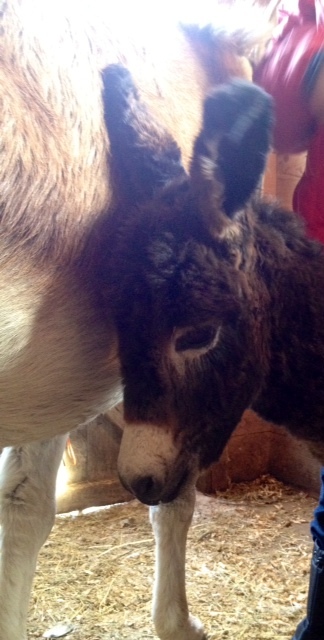A donkey’s role in the bibilcal narrative of Jesus’ birth added a touch of symbolic awe this past Christmas for animal rescue advocate Brogan Horton.
Shortly before the holiday, Horton, the executive director of the Animal Rescue Unit in Bridgton, took in a severely neglected donkey that was reportedly very pregnant and headed for a Pennsylvania slaughterhouse.
There was no time to prepare a birthing stall and apparently no need for one.
The donkey, named Delilah, didn’t appear to be pregnant.
“She wasn’t very big, had no udder to speak of and tested negative for pregnancy when examined by a local (veterinarian),” said Horton.
Delilah roamed about in a penned area, preferring to sleep outdoors in one of the rescue’s open-air shelters with some alpacas and horses rather than in the barn.
“Many severely abused animals are skittish about coming indoors and will only come in at feeding time,” said Horton.
On Christmas Day, Delilah trotted into the barn at feeding time … a fresh coat of snow on her back from stormy weather and a tiny male foal at her side.
“We call him our little miracle donkey,” said Horton.
“We think Delilah gave birth to him sometime between Christmas Eve and Christmas Day. No one was there to witness it except the other animals who were out there with her while she was in labor. It’s kind of funny because our alpacas look like little camels. So, we apparently had our own live Nativity scene happening out there for Christmas.”
The tiny male donkey, known as a jack, weighed about 45 pounds and since has gained 5 more pounds, despite having a few physical setbacks during his first few days on the planet, including a swollen leg and a fever.
Unable to pay for an estimated $2,000 vet bill to treat the baby, Horton, a vet tech, administered the needed medicine herself.
She kept around-the-clock vigil in Delilah’s stall to get hourly temperature readings on the foal.
The jack joins a menagerie of animals on the farm that includes 10 horses, three alpacas, two goats, three rabbits, 25 chickens and a potbellied pig.
Horton said animal rescue work is in her blood.
She was raised on a farm that has been in her family for seven generations and both her mother and grandmother previously ran animal shelters in Bridgton.
Horton founded the Maine nonprofit rescue a decade ago on the 60-acre farm after coming to the aid of two horses destined for slaughter.
“I was only 16 when we began and was not legally old enough to run the organization. So, my parents oversaw the rescue until I came of age,” she said.
Horton uses her income as a horse trainer to pay for the upkeep and care of the rescued animals.
The work is supplemented by community donations and occasional fundraisers for big ticket expenditures.
She dreams of transitioning to a federal nonprofit that offers mentor training to at-risk youths, but can’t afford the application fee of nearly $800.
“Every time we get close to having the money to register, something comes up,” Horton said.
The cost of Delilah’s journey to Maine and the birth of her foal was nearly $1,000.
And, the rescue took a few financial hits in 2012.
Its only horse trailer was crushed by a falling tree, so the rescue must pay transportation fees to get animals to the property; an outdoor shelter, adopted by the alpacas, was destroyed during a recent snowstorm.
And the water lines in the barn froze, leaving Horton and barn manager Jennifer Anderson to lug 45 5-gallon buckets of water from the house twice daily, for morning and evening animal feedings.
“It’s a lot of work but in keeping with our mission to provide shelter for abused and neglected animals and new loving homes for those we can rehabilitate,” Horton said.
The rescue has a strict adoption process that requires background checks, property inspections, reference checks and a pledge to return animals if, at any time, a new owner can no longer care for them.
Surrendered animals live out their days at the rescue among pets that due to severe past abuse or neglect are deemed not adoptable — animals like Delilah, who arrived malnourished and with hooves untrimmed and curling up over themselves, resulting in an abscess.
The foal, temporarily named Dominic after an Italian Christmas carol about a donkey who comes bearing gifts, is expected to transition to adoption to make room for other animals needing sanctuary.
For now, his presence is providing the gift of funds to keep things going at the rescue.
Horton is holding a fundraiser to name the new foal for $2 per entry.
Send questions/comments to the editors.



Success. Please wait for the page to reload. If the page does not reload within 5 seconds, please refresh the page.
Enter your email and password to access comments.
Hi, to comment on stories you must . This profile is in addition to your subscription and website login.
Already have a commenting profile? .
Invalid username/password.
Please check your email to confirm and complete your registration.
Only subscribers are eligible to post comments. Please subscribe or login first for digital access. Here’s why.
Use the form below to reset your password. When you've submitted your account email, we will send an email with a reset code.